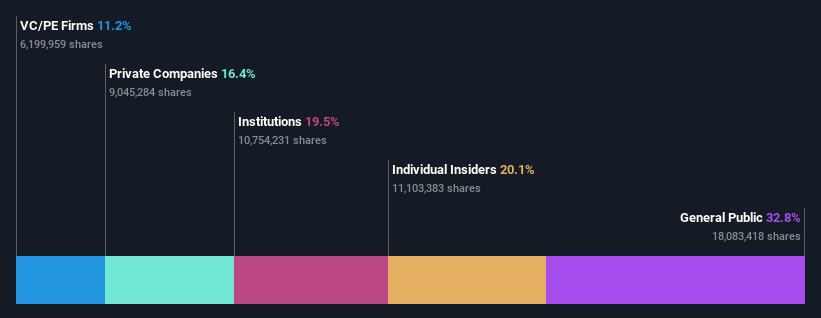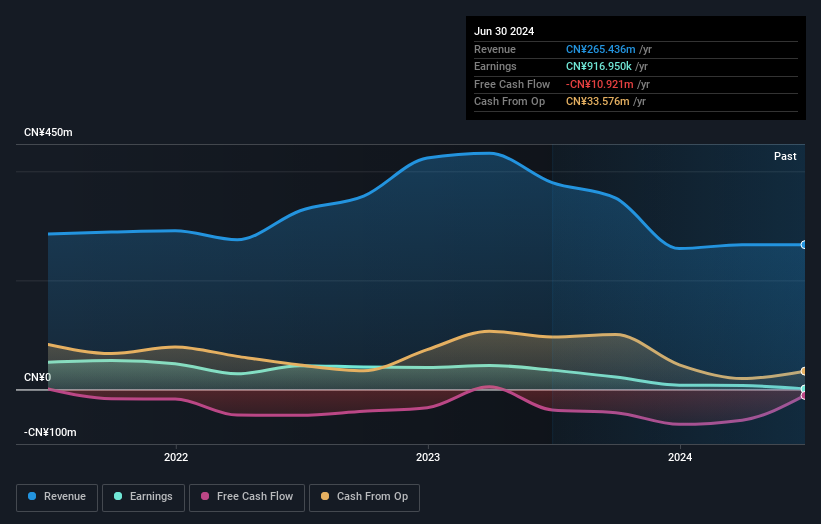Individual investors who hold 33% of Shanghai Rightongene Biotechnology Co., Ltd. (SHSE:688217) gained 17%, insiders profited as well

Key Insights
- Shanghai Rightongene Biotechnology's significant individual investors ownership suggests that the key decisions are influenced by shareholders from the larger public
- 52% of the business is held by the top 8 shareholders
- Insider ownership in Shanghai Rightongene Biotechnology is 20%
A look at the shareholders of Shanghai Rightongene Biotechnology Co., Ltd. (SHSE:688217) can tell us which group is most powerful. And the group that holds the biggest piece of the pie are individual investors with 33% ownership. Put another way, the group faces the maximum upside potential (or downside risk).
Following a 17% increase in the stock price last week, individual investors profited the most, but insiders who own 20% stock also stood to gain from the increase.
Let's take a closer look to see what the different types of shareholders can tell us about Shanghai Rightongene Biotechnology.
See our latest analysis for Shanghai Rightongene Biotechnology

What Does The Institutional Ownership Tell Us About Shanghai Rightongene Biotechnology?
Many institutions measure their performance against an index that approximates the local market. So they usually pay more attention to companies that are included in major indices.
Shanghai Rightongene Biotechnology already has institutions on the share registry. Indeed, they own a respectable stake in the company. This implies the analysts working for those institutions have looked at the stock and they like it. But just like anyone else, they could be wrong. If multiple institutions change their view on a stock at the same time, you could see the share price drop fast. It's therefore worth looking at Shanghai Rightongene Biotechnology's earnings history below. Of course, the future is what really matters.

Shanghai Rightongene Biotechnology is not owned by hedge funds. The company's CEO Hui Xiong is the largest shareholder with 18% of shares outstanding. Hangzhou Haoying Investment Management Partnership Enterprise (Limited Partnership) is the second largest shareholder owning 11% of common stock, and Shanghai Boci Investment Partnership Enterprise (Limited Partnership) holds about 8.9% of the company stock.
On further inspection, we found that more than half the company's shares are owned by the top 8 shareholders, suggesting that the interests of the larger shareholders are balanced out to an extent by the smaller ones.
Researching institutional ownership is a good way to gauge and filter a stock's expected performance. The same can be achieved by studying analyst sentiments. We're not picking up on any analyst coverage of the stock at the moment, so the company is unlikely to be widely held.
Insider Ownership Of Shanghai Rightongene Biotechnology
The definition of an insider can differ slightly between different countries, but members of the board of directors always count. Management ultimately answers to the board. However, it is not uncommon for managers to be executive board members, especially if they are a founder or the CEO.
I generally consider insider ownership to be a good thing. However, on some occasions it makes it more difficult for other shareholders to hold the board accountable for decisions.
Our most recent data indicates that insiders own a reasonable proportion of Shanghai Rightongene Biotechnology Co., Ltd.. Insiders have a CN¥178m stake in this CN¥882m business. We would say this shows alignment with shareholders, but it is worth noting that the company is still quite small; some insiders may have founded the business. You can click here to see if those insiders have been buying or selling.
General Public Ownership
The general public, who are usually individual investors, hold a 33% stake in Shanghai Rightongene Biotechnology. This size of ownership, while considerable, may not be enough to change company policy if the decision is not in sync with other large shareholders.
Private Equity Ownership
With a stake of 11%, private equity firms could influence the Shanghai Rightongene Biotechnology board. Some might like this, because private equity are sometimes activists who hold management accountable. But other times, private equity is selling out, having taking the company public.
Private Company Ownership
We can see that Private Companies own 16%, of the shares on issue. It's hard to draw any conclusions from this fact alone, so its worth looking into who owns those private companies. Sometimes insiders or other related parties have an interest in shares in a public company through a separate private company.
Next Steps:
I find it very interesting to look at who exactly owns a company. But to truly gain insight, we need to consider other information, too. Consider for instance, the ever-present spectre of investment risk. We've identified 5 warning signs with Shanghai Rightongene Biotechnology (at least 3 which don't sit too well with us) , and understanding them should be part of your investment process.
If you would prefer check out another company -- one with potentially superior financials -- then do not miss this free list of interesting companies, backed by strong financial data.
NB: Figures in this article are calculated using data from the last twelve months, which refer to the 12-month period ending on the last date of the month the financial statement is dated. This may not be consistent with full year annual report figures.
New: Manage All Your Stock Portfolios in One Place
We've created the ultimate portfolio companion for stock investors, and it's free.
• Connect an unlimited number of Portfolios and see your total in one currency
• Be alerted to new Warning Signs or Risks via email or mobile
• Track the Fair Value of your stocks
Have feedback on this article? Concerned about the content? Get in touch with us directly. Alternatively, email editorial-team (at) simplywallst.com.
This article by Simply Wall St is general in nature. We provide commentary based on historical data and analyst forecasts only using an unbiased methodology and our articles are not intended to be financial advice. It does not constitute a recommendation to buy or sell any stock, and does not take account of your objectives, or your financial situation. We aim to bring you long-term focused analysis driven by fundamental data. Note that our analysis may not factor in the latest price-sensitive company announcements or qualitative material. Simply Wall St has no position in any stocks mentioned.
About SHSE:688217
Shanghai Rightongene Biotechnology
Shanghai Rightongene Biotechnology Co., Ltd.
Moderate with adequate balance sheet.


